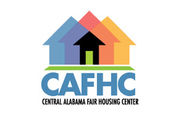Fair Housing: Trends, Challenges and Solutions
What is fair housing and how might it affect you? CAFHC breaks down what you need to know about the Fair Housing Act
What is fair housing and how does it impact you? For starters, if you’re seeking to buy a home, currently selling a home, are a renter or a landlord, you probably are affected by fair housing and its trends, patterns, and challenges.
At the Central Alabama Fair Housing Center, it’s our mission to ensure equal housing opportunity for all people living in the area regardless of race, color, national origin, religion, gender, family status, or disability. We are dedicated to educating individuals on fair housing laws and, in turn, enforcing those fair housing laws and thus eliminating housing discrimination. Following, we break down what you need to know about fair housing and how we are here to help.
What is Fair Housing?
Fair housing, as defined by the Fair Housing Act of 1968, establishes a national policy making it illegal to discriminate in the sale, lease, or rental agreement of any form of housing, or to make housing unavailable-because of race, color, religion, sex, handicap, familial status, or national origin, among other stipulations.
Thanks to fair housing, all individuals are entitled to equal treatment and access to all properties by landlords, agents, brokers, realtors, and home sellers. Under the law, if an individual believes they haven’t received fair consideration or treatment, they can file a housing discrimination claim with Central Alabama Fair Housing Center and the U.S. Department of Housing and Urban Development.
What Does Fair Housing Mean for the Buyer/Renter?
Home “seekers” have the right to expect that housing will be available without discrimination. This includes the right to expect:
- Housing in any price range available without discrimination
- Equal professional service
- The opportunity to consider a range of housing options
- No discriminatory limitations on communities or locations
- No discrimination in the financing, appraising, or insuring of property
- Reasonable accommodations for persons with disabilities
- Non-discriminatory terms and conditions for home sale, rental, financing, or insuring
- No harassment or intimidations for exercising fair housing rights
What Does Fair Housing Mean for the Seller or Landlord?
A home seller or landlord cannot establish discriminatory terms or conditions in the purchase or rental contract of a property, deny that housing is available, or advertise that property is available only to persons of a certain race, color, religion, sex, handicap, familial status, or national origin.
Trends in Fair Housing
There is still much work to do on the forefront of fair housing and its widespread adoption. However, we’ve also made many strides since the Fair Housing Act’s original adoption.
Legislation Improvement
Throughout the years, the Fair Housing Amendments Act has extended the scope of discriminatory acts to include actions such as interference, coercion, and the intimidation and threatening of individuals who assert their rights under the Fair Housing Act. It has also made the process easier for individuals filing housing complaints and has granted HUD the power to take enforcement actions and impose sanctions for violations of the Act.
On a continual basis, improvements are being made to the act to ensure a better, safer, and more inclusive process for all parties involved.
Continued Education
Increased education and outreach have allowed for the implementation of local fair housing educational programs, as well as the nationwide dissemination of public education and training materials that can be replicated and modified by local organizations across the nation.
Education serves a vital role in fair housing enforcement. It informs consumers about their rights and how to recognize and report possible discrimination, and it teaches housing providers how to comply with fair housing laws to avoid fair housing violations.
In fact, we at CAFHC work to increase public awareness of fair housing rights and to educate consumers and housing professionals about their responsibilities under the Fair Housing Act. We believe efforts like these are essential in eliminating discrimination and that through education, people might feel more empowered to exercise their fair housing rights.
Through our education and outreach program we:
- Develop and conduct workshops on fair housing laws to civic, community and governmental organizations.
- Conduct trainings for realtors, property managers, landlords, and other industry professionals about their obligations under the Fair Housing Act.
- Tailor and conduct training programs on specific fair housing issues.
- Publish and distribute an educational e-newsletter.
Supporting the Affected
Since 1988, the Department of Justice alone has filed more than 60 lending discrimination
cases, most of them alleging violations of the Fair Housing Act. The mortgage lending discrimination cases have resulted in close to $1 billion in payments to multiple entities, including victims of discrimination, community investments, loan subsidies, education of and marketing to consumers, and the opening of new bank branches in underserved neighborhoods.
More Work Needs to Be Done
There are countless more strides to be made. In the past two years alone, many of the Fair Housing headlines have been shocking: HUD: People with Mental Disabilities Face Significant Housing Discrimination; Transgender Rental Bias Severely Limits Housing Choices; HUD: Wheelchairs Users and Deaf Face Discrimination in Rental Housing Market.
Change starts with enforcement. We at CAFHC are dedicated to combating violations of the fair housing laws in the central Alabama area, providing relief to victims of discrimination and preventing future discriminatory conduct.
You can join in the fight to end housing discrimination. Contact your friends at CAFHC today to learn more and to get your questions answered!

